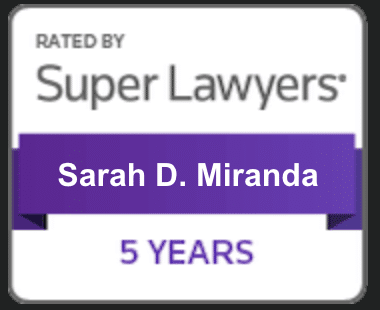Separation and Divorce
Divorce isn’t easy. Whether you and your spouse seek an uncontested divorce or have trouble agreeing on significant terms, it all can be a painstakingly emotional process laced with hurt and uncertainty for all parties involved. Seeking legal assistance from a trusted and experienced divorce attorney in North Carolina can be a lifesaver. At Miranda Law Firm, we help take the burden off your shoulders and ensure your best interests are protected.
Understanding Separation vs. Divorce
Separation is the first step toward divorce. In North Carolina divorce law, it is required a couple live separately for at least a year and a day before they are eligible for divorce. This means you must have been living in different homes with the intent the separation remains permanent. To file for a divorce in North Carolina, either you or your spouse must currently live in North Carolina and must have lived in the state for at least six months before the divorce case is filed.
There are many issues you and your spouse must address. Key issues to work around include:
- Child custody
- Child support
- Division of marital assets and debts
- Spousal support (alimony if divorced)
North Carolina is a no-fault divorce state, meaning either spouse can move forward to end the marriage without providing any allegations of fault.
Suppose you and your spouse have lived separately for a year or more with the intention of separation to be permanent and can come to a mutual agreement on all family matters. In that case, you may consider filing for an uncontested divorce.
Skillful Representation for North Carolina Separation and Divorce
If unable to reach a mutual agreement, the Miranda Law Firm is ready to stand by your side through family court litigation to resolve your case. Divorce in North Carolina can be complex when it involves the division of marital property, debt, child custody battles, among other things. The Miranda Law Firm will offer competent legal care and representation. With the help of our experienced Fayetteville divorce lawyer, Sarah Miranda, we’ll guide you through alternative dispute resolutions, settlements, and negotiations to help achieve positive outcomes for the future. If unable to reach a mutual agreement, we’re fully prepared to take the matter into litigation as necessary.
With a competent family attorney by your side, you’ll stay informed of your options and get through the process as smoothly as possible. Sarah Miranda is committed to providing compassionate counsel, open communication, and outstanding representation for every client.
Name Change After Divorce
For women, a name change after a divorce in North Carolina may be painful. It may be a symbol of the end of one life and the beginning of another. A divorcee may choose to rename oneself to the name of a deceased husband, according to North Carolina law, or to another former husband who is the father of your children – only the last name of the children.
Sarah Miranda counsels in two options when it comes to a name change after divorce in North Carolina: As part of the divorce process or as part of a name change after the fact. A name doesn’t change after a divorce due to several factors. If children are involved, property ownership and legal documentation changes for instance social security numbers, etc., these all may impede name changes. To simplify matters, make sure that a name change is part of the divorce proceedings.
***MOBILE DESIGN STARTS HERE***
Separation and Divorce
Understanding
Separation vs. Divorce
Separation is the first step toward divorce. In North Carolina divorce law, it is required a couple live separately for at least a year and a day before they are eligible for divorce. This means you must have been living in different homes with the intent the separation remains permanent. To file for a divorce in North Carolina, either you or your spouse must currently live in North Carolina and must have lived in the state for at least six months before the divorce case is filed.
There are many issues you and your spouse must address. Key issues to work around include:
- Child custody
- Child support
- Division of marital assets and debts
- Spousal support (alimony if divorced)
North Carolina is a no-fault divorce state, meaning either spouse can move forward to end the marriage without providing any allegations of fault.
Suppose you and your spouse have lived separately for a year or more with the intention of separation to be permanent and can come to a mutual agreement on all family matters. In that case, you may consider filing for an uncontested divorce.
Skillful Representation for North Carolina Separation and Divorce
If unable to reach a mutual agreement, the Miranda Law Firm is ready to stand by your side through family court litigation to resolve your case. Divorce in North Carolina can be complex when it involves the division of marital property, debt, child custody battles, among other things. The Miranda Law Firm will offer competent legal care and representation.
With the help of our experienced Fayetteville divorce lawyer, Sarah Miranda, we’ll guide you through alternative dispute resolutions, settlements, and negotiations to help achieve positive outcomes for the future. If unable to reach a mutual agreement, we’re fully prepared to take the matter into litigation as necessary.
With a competent family attorney by your side, you’ll stay informed of your options and get through the process as smoothly as possible. Sarah Miranda is committed to providing compassionate counsel, open communication, and outstanding representation for every client.
Name Change After Divorce
For women, a name change after a divorce in North Carolina may be painful. It may be a symbol of the end of one life and the beginning of another. A divorcee may choose to rename oneself to the name of a deceased husband, according to North Carolina law, or to another former husband who is the father of your children – only the last name of the children.
Sarah Miranda counsels in two options when it comes to a name change after divorce in North Carolina: As part of the divorce process or as part of a name change after the fact. A name doesn’t change after a divorce due to several factors. If children are involved, property ownership and legal documentation changes for instance social security numbers, etc., these all may impede name changes. To simplify matters, make sure that a name change is part of the divorce proceedings.







